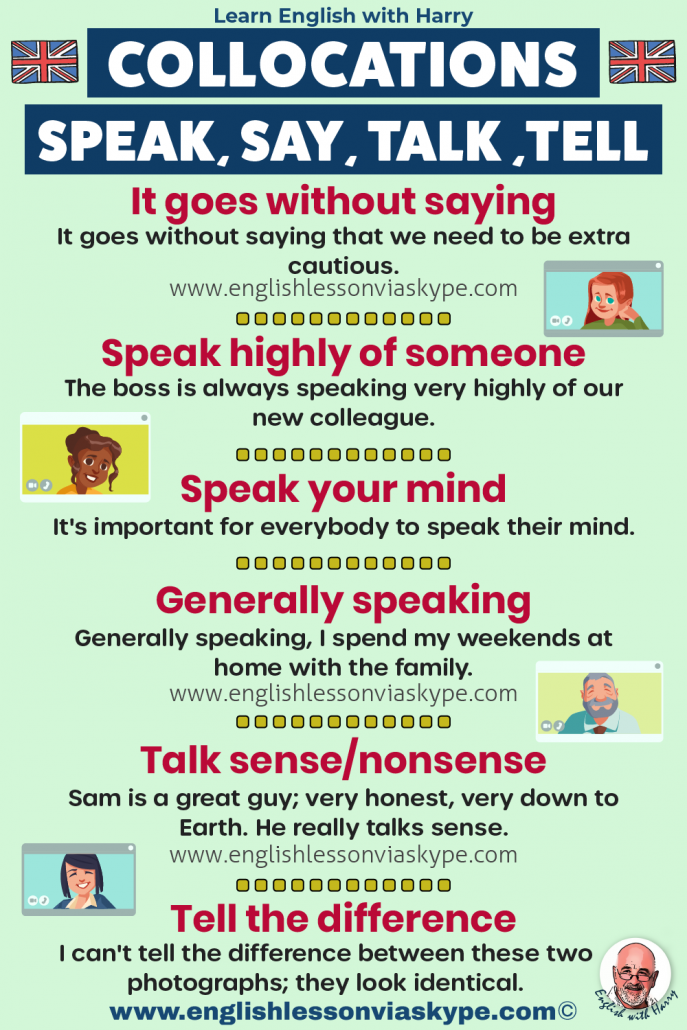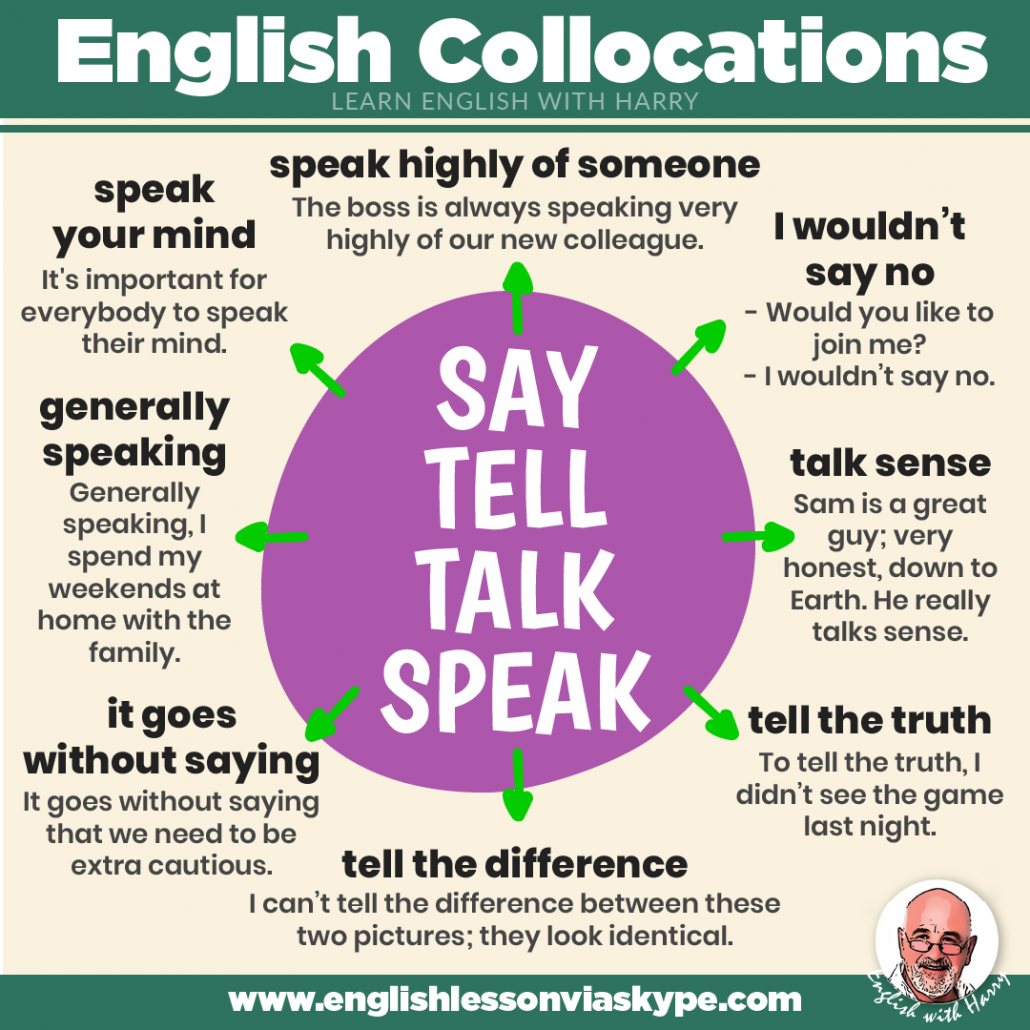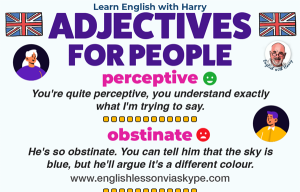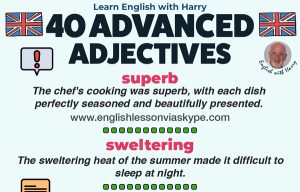Here you will learn popular collocations with say, speak, talk and tell.
Learn English natural collocations and speak like a native.
Speak better English with Harry - Episode 305
Table of Contents
Harry
Collocations with say, speak, talk and tell

Hi there, this is Harry and welcome back to my English learning podcast Speak Better English with Harry. Here I try to help you to get a better understanding of the English language.
You will be able to enjoy your conversations, improve your business English, or help yourself to get through those stages of job interviews. We look at grammar, English idioms, expressions and phrasal verbs.
Intermediate to Advanced English Marathon

INSANITY: doing the same thing over and over again and expecting different results.
Albert Einstein
- What you'll learn:
- better understanding of more complex grammar structures
- advanced English vocabulary words
- British & American slang
- perfect your listening skills through practing different accents
- This marathon is for you if you're:
- stuck at an intermediate English level
- tired of confusing explanations
- a mature student
- shy & introverted
Today I thought we would look at some English collocations. These are collocations with say, speak, talk and tell. These are all very similar words, and some students get a little bit confused with them.
Remember, we always say something TO somebody.
We can tell somebody something.
✔️ I tell them a story.
❌ I say them a story.
✔️ He told them a bit of news.
❌ I said them a bit of news.
✔️ I need to speak/talk to a friend.
Let’s start at the beginning:
I wouldn’t say no
We use this when somebody wants to say yes. It’s one of these situations where you use a double negative.
Normally, we would say not to use double negatives, but here it is one of those exceptions.
Example:
- Would you like to join me for a walk?
- I wouldn’t say no.
Example:
- Would you like a slice of cake?
- I wouldn’t say no.
book your trial English Lesson
it goes without saying
We really shouldn’t need to say something because somebody should understand it, but we will say it anyway.
Example:
We need to leave a little bit earlier than we might normally do, and of course, it goes without saying that we should wear our masks at all times.
We’re using this expression to emphasise some point that we want to make, and we really don’t believe that we have to say something because everybody should understand.
to speak very highly of someone/something
To give someone or something praise. We use this expression when we hold someone in high regard; we believe they are really top class, or we’ve got a lot of confidence in them.
Examples:
The boss is always speaking very highly of our new colleague. They worked together in the past, and she thinks that the sun shines out of him.
The government ministers spoke very highly of the quality of the service they received when they visited the country.
We can also say:
I can’t speak highly enough of him
Meaning no matter what I say, it’s not going to be enough; I should be able to say more. I think he’s really really really good, and even when I say that, I’m sure I could say more if I could find the words to express it.
Collocations with say, speak, talk and tell

Share and help other students to improve English language skills.
to speak your mind
To say exactly what you are thinking.
Examples:
We would encourage all participants to speak their minds.
It’s important for everybody to speak their mind.
When you speak your mind, you still have to be respectful of other people and that they may not necessarily agree with you.
generally speaking
This is a way of telling people what you normally do or quite often do, but it doesn’t necessarily mean you always do it.
Examples:
Generally speaking, I spend my weekends at home with the family.
Generally speaking, we like to go away for the summer holidays. Get out of the city and go to a quiet place, if we can find it. This year is an exception; we’re going to have a staycation.
Collocations with say, speak, talk and tell
to talk business
When we talk business, that’s literally what it means. We’re not talking about the family, we’re not talking about football, we’re not talking about our holidays, we’re talking business.
Example:
That’s enough of that; let’s talk business. Let’s get down to it and talk about what we’re really here to talk about.
to talk sense/nonsense
These are opposites, of course.
Everything that someone says makes sense; everything is practical.
Examples:
Sam is a great guy; very honest, very down to Earth. He really talks sense.
I don’t know what people see in him. I don’t know why they voted for him. Most of the time, he talks complete nonsense.
Collocations with say, speak, talk and tell
to tell somebody a secret
To give someone some intimate information.
Example:
Jane couldn’t wait to tell her the secret about his past.
to tell the difference between
To separate, to distinguish.
Examples:
Nobody was able to tell the difference between him and his twin brother.
I can’t tell the difference between these two photographs; they look identical.
Any time that we are looking to tell the difference between two or more things, we’re looking for little things that will differentiate one from the other.
Collocations with say, speak, talk and tell
to tell the truth
We use this expression when we want somebody to be honest, or we want to be honest with somebody.
Examples:
- What are your comments on that marketing paper?
- Well, to tell the truth, I didn’t get a chance to study it in detail. I only read the summary.
To tell the truth, I didn’t actually see the game last night. One of the kids was sick.
Tell me the truth, where did you hide your end-of-year report?
Here are collocations with say, speak, talk and tell. Let me give them to you one more time:
- I wouldn’t say no
- it goes without saying
- speak very highly of someone
- speak your mind
- generally speaking
- talk business
- talk sense/nonsense
- tell somebody a secret
- tell the difference
- tell the truth
If you want to contact me, you can get me on www.englishlessonviaskype.com Always happy to hear from you. Please contact me for one-to-one English lessons on Zoom or Skype. If you want to study for an English proficiency test, or if you want to prepare for a job interview in English, you know where you can contact me.
Thanks for listening. Join me again soon.
More information
For more information on English grammar rules, English collocations and English idioms, check out the links below:
10 Ways to finish an email in English
Don’t forget that you can always study English advanced level at Learning English with the BBC.
You will love these English lessons

Adjectives To Describe A Person in English
Top advanced adjectives to describe a person in English. This video is great for advanced English language learners who are


Short English Travel Vocabulary
Learn important English travel vocabulary words and phrases that will help you feel comfortable on your next adventure. English for


40 Advanced English Adjectives for Fluency
Learn 40 advanced English adjectives for fluency. This lesson is perfect for intermediate to advanced English learners. You will learn